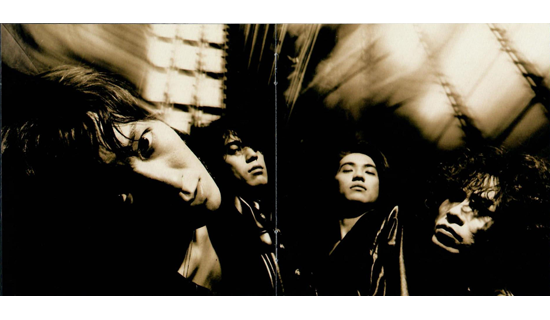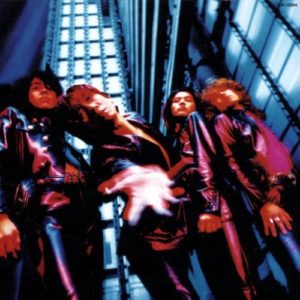
- Four Seasons
- Overture ~ Taiyou ga Moeteiru
- I Love You Baby
- Tactics
- Period no Ame
- Love Sauce
- Sweet & Sweet
- Tsuki no Uta
- Tsuioku no Mermaid / Original Lyric Version
- Father
- Sora no Ao to Hontou no Kimochi
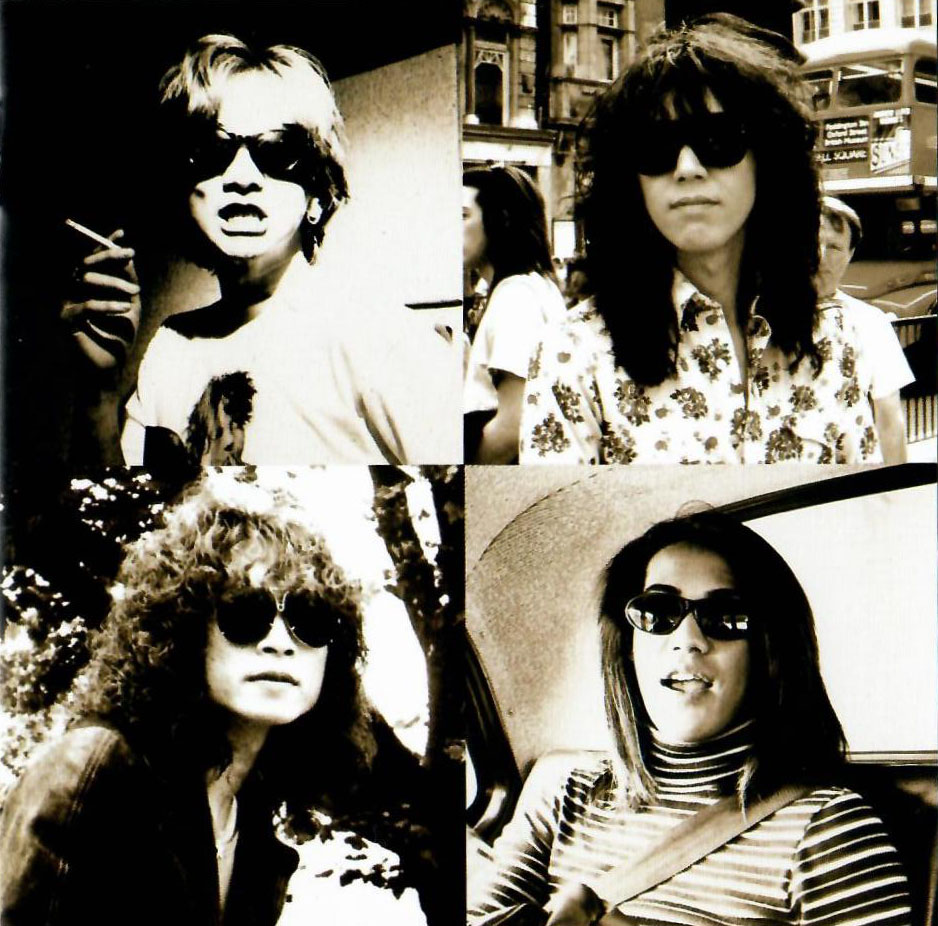
Stop me if this sounds familiar: The Yellow Monkey telling music magazines that this is them making a straightforward and organic album:
For a band like us to make something like this given the current state of Japanese rock is really amazing…I’ve gotten a lot of complaints, from both fans and the media: That we’ve gotten arrogant, and that we’ve gone pop in order to sell albums. And I feel like smacking people who say those things in the head with a hammer. But we made it without thinking about all of that, and I feel like the album we made just organically came out to be really cool. We didn’t strain ourselves to make it.
Kazuya Yoshii, Rockin’ On Japan Vol. 103 (10/1995)
Everything in this album really did just come out naturally. For “Smile” we really were consciously trying to make it an easy to understand album. But this time we didn’t even have to think about it, it just came out that way naturally…I guess “naturally” is really the only way I can put it.
Annie, Rockin’ On Japan Vol. 103 (10/1995)
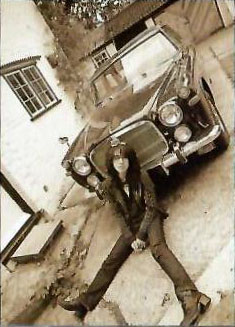
That’s right, this is echoing everything the band said about the previous album, Smile. That album did quite a bit better for them sales-wise than anything before it, but even with a newfound emphasis on writing songs that are more accessible and easier to understand, Smile still didn’t get them that coveted number one spot on the Oricon charts (it only got number four). And even though Smile had some very high highs, it had quite a few low lows as well. It was a stunted album that clearly came out during a confused transitionary period for the band. So why should anyone believe it when they’re just saying the same things again about Four Seasons?
The difference is that this time, everything they’re saying is actually true! Four Seasons is a very organic sounding rock album that actually feels like the band reinventing themselves into a new form. It’s one that’s kind of like taking a little bit of Smile, a little bit of Jaguar Hard Pain, and throwing them in a blender. But Four Seasons is way more than a sum of those individual parts, and it’s an album that would show the band the way to changing into what many would argue is their ultimate form. And all of this within the same year that Smile was released!

But if they hadn’t changed their minds about going in a more mainstream direction, what changed between Smile and this? The biggest thing was Yoshii’s overall mood and outlook on life, which seems to have pulled him out of the rut he was in during Smile:
…well my mental state right now is pretty close to what it was when I was in middle school: Loving the sun, and just simple. And well…I’ve hardly ever been satisfied with the songs on the albums that we’ve released so far. It’s embarrassing to admit, but a song that I end up revising shows it in terms of emotions when I sing it. The song that I’ve been the most satisfied with is “Silk Scarf ni Boushi no Madam”. It was the song that inspired me to write the song “Four Seasons”, as I realized all over again that it was a direction that I could go in. I was always conflicted over not being able to sing songs like this in my own words, without pretending to be a character. This time I finally decided that I’m able to do it, and when I did I also realized that this song is still a part of me, even normally.
Kazuya Yoshii, Rockin’ On Japan Vol. 103 (10/1995)
The first lyric in the title track of the album is “I’m going to break it all apart” (“mazu boku wa kowasu”). This is me saying that no matter if you’re a dark person or a lonely one, your life doesn’t have to be sad. You should try to bring out the sun that’s inside of you with a big bang. I was really thinking about breaking out of the shell that I’d shut myself into, and that was the theme of the album.
Kazuya Yoshii, In Search of Lost Love (Ushinawareta Ai wo Motomete)
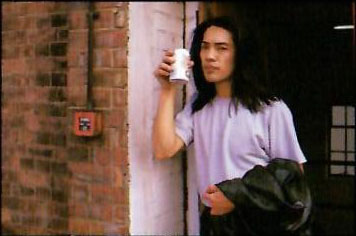
Another big change for the band is that they went to England to record for the very first time: At Ridge Farm Studio in Surrey and Westside Studio in London, to be exact. The mixing was done at Mayfair Studio, also in London. Queen fans will recognize Ridge Farm Studio as the rural studio that they recorded Night at the Opera at, shown in their 2018 biopic Bohemian Rhapsody. This had a huge impact both in terms of the sound on Four Seasons, and the types of songs that Yoshii wrote for the album:
Four Seasons was a real turning point album for us, and “Father” was a fairly refreshing tune for the band. The rest of the members were really surprised, they told me they didn’t think I’d write a song with these kinds of themes. Because I hadn’t done anything like it when I typically write songs and we rehearse them here in Japan. I was just so happy to be actually recording an album in London, and that’s what came out of me as a result.
Kazuya Yoshii, In Search of Lost Love (Ushinawareta Ai wo Motomete)
We went to England to record for the first time, and that had quite a lot of influence on the album’s sound. If we’d recorded it in Japan, I think we would have done a lot of dubbing and mixing on the recording. And as a result of not doing that, each individual sound is a lot thicker. It’s a lot more powerful this way.
Kazuya Yoshii, Talkin’ Rock (01/1996)
This all makes Four Seasons arguably the best album in terms of consistency and overall quality that the band has made so far (though it still isn’t my favorite). The high points may not go quite as high as some of the singles found on Smile, but there also aren’t any songs on Four Seasons that bring down the album nearly as much as Smile’s worst or most boring tracks.
That’s why listening to it several years after the fact, I feel like it’s probably just as amazing of an album as “Bunched Birth”.
Kazuya Yoshii, Bridge Vol. 14 (04/1997)
It’s the same with “Sora no Ao to Hontou no Kimochi”. I think this album is a masterpiece because of those three songs (the other two being “Taiyou ga Moeteiru” and “Father”). At least that’s the way I feel!
Kazuya Yoshii, Bridge Vol. 14 (04/1997)
With their play to get popular really having worked this time, the band was now appearing on music programs on Japanese TV, and would embark on their biggest and longest national tour yet. But with this success came more of the band’s fans from the old days calling them sell-outs, which Yoshii really struggled quite a bit with:
You could say that “Taiyou ga Moeteiru” was my last resort, or sort of a foul in its own way. And that’s because it made a lot of the fans that had stuck with us since the old days really mad: They were like “What the hell is this song!?”. They were really scathing toward us, saying that The Yellow Monkey didn’t need to be doing songs like this. What the hell is this new, eloquent route that we were on?! And so this time I felt afraid that I’d abandoned the people who had supported me, so I just couldn’t feel any joy in it. It was all just really, really frustrating! That’s why I didn’t leave anything on the table for “Sicks”, the next album after this one. When we released it I was just thinking “God dammit you guys!”.
Kazuya Yoshii, In Search of Lost Love (Ushinawareta Ai wo Motomete)
This is an unavoidable part of any band getting popular though, no matter what part of the world you’re in. It’s also worth mentioning that this was then band management director Hiroyuki Munekiyo’s favorite album:
For me it’s “Taiyou ga Moeteiru”. I think their best album is “Four Seasons”, and “Taiyou ga Moeteiru” is a very important song for that album. When I’m talking with new artists about song writing, I use that song as an example. And when I mention “This is the secret of why this sold so well” in talking about songs I was involved with, there’s a lot of persuasive power in that.
Hiroyuki Munekiyo, Natalie.mu Interview (2013)
And not to say that the band wasn’t good live before, but the Four Seasons tour elevated their live performances to a whole new level. They were so full of energy, and made every song they played sound so good. I feel that some songs saw their best performances during the Four Seasons tour, even now.
Their performances were great too. They were in the groove, and they weren’t being stingy with it.
Band photographer Mikio Ariga, Natalie.mu Interview (2013)
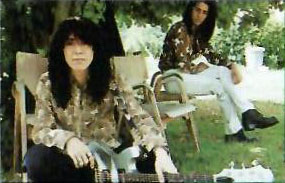
The design of the Four Seasons album booklet is largely based around the band’s time in England. Steve Gullick is credited as Photographer, who’s something of a rock photographer legend at this point. He’s well known for his pictures of Nirvana specifically, and having spent 1990-1993 pretty much documenting the Grunge scene. The booklet also notes that some of the other photographs were taken by M. T-Max Sada, R. Usher, T. Kishi, T. Hiraishi, T. Ohmori, H. Munekiyo, and H. Ohnishi though. Costume design for the photo shoots is also credited to Green Carnation. And Hideaki Onishi (aka Jimmy Onishi) is once again credited with Art Direction and Packaging Design.
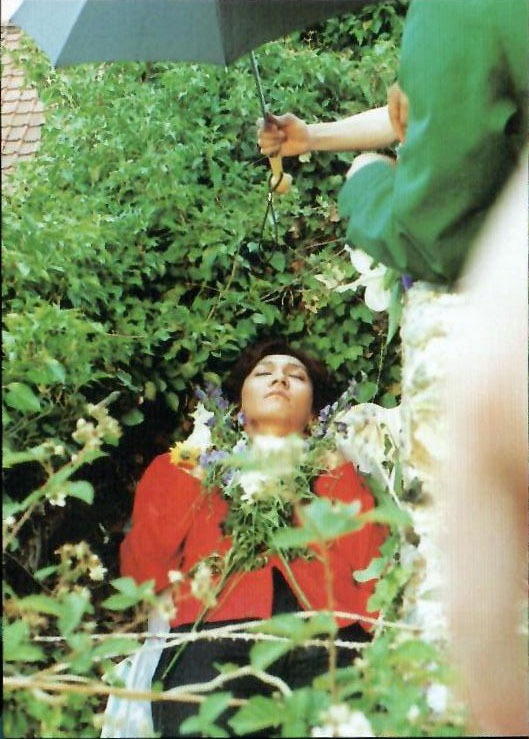
Since the arrangements on this album aren’t particularly elaborate, the list of supporting musicians is similarly small. The title of regular support keyboardist has pretty much completely been transferred over to Yoshitaka Mikuni at this point (we saw him come in for some of the tracks on Smile), who has been joining them for live performances as well since their songs have been becoming more keyboard-heavy as of late. The one exception is Tsuioku no Mermaid, for which the keyboards and partial arrangement credit are given to Akihiko Matsumoto (though only for the single version of the song, not the slightly re-arranged album version). Matsumoto is a composer/arranger/musician that would later become known for work as a composer for Japanese TV commercials, dramas, anime, and movies. And lastly we have Rebecca Leigh-White and Jordan Bailey, who did backing vocals for Love Sauce.
I’ve always thought Four Seasons was a good album, but I really gained a new appreciation for it having listened to it chronologically. It feels like a much better blend of the band’s core identity and mainstream appeal than Smile did, and is just a well constructed album independent of any surrounding circumstances. True to what Yemon was trying to achieve, it does make for an excellent and more accessible entry point to the band’s catalog. And if for some reason this was your first Yemon album today, the band’s current sound wouldn’t even seem too far removed from this in many ways. They’ll just keep going up and up from here, and Four Seasons is the solid foundation that they needed in order to achieve that even greater success later.
